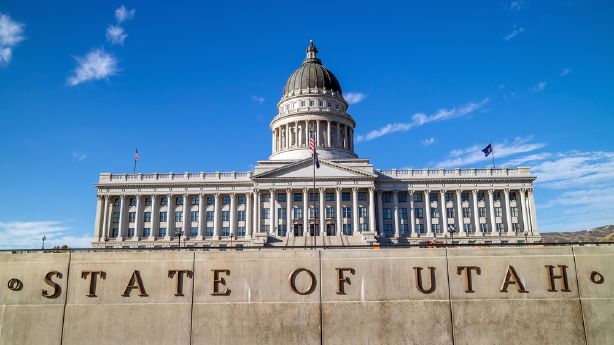Practically every week now there are new developments to report about US States advancing or enacting legislation to make gold and silver legal tender
 Bullion.Directory precious metals analysis 30 April, 2023
Bullion.Directory precious metals analysis 30 April, 2023
By Ronan Manly
Precious Metals Research Analyst at BullionStar
As the US Federal Government and Federal Reserve head ever more into the abyss of destroying the value of the US dollar, continually breaching debt ceilings, creating asset bubbles, and intervening in and manipulating financial markets, there is an accelerating counter force emerging in the US that is the antithesis of this Federal Government and Federal Reserve madness.
That is the Sound Money movement in the US. Generally speaking, a sound money is a money that is able to maintain a stable purchasing power over time and does not significantly fluctuate due to inflation or deflation. Sound Money is most often associated with a tangible asset, such as gold, which has a low supply increase (or tight monetary controls) to ensure its stability. To paraphrase Mises, a sound money can “protect against arbitrary actions by sovereigns to depreciate the currency.”
The Sound Money Defense League defines sound money as follows:
“Sound money is money that is not prone to sudden appreciation or depreciation in purchasing power over the long term, aided by self-correcting mechanisms inherent in a free-market system.”
The movement for Sound Money in the United States is most powerful and effective on the State level, and its a movement which is grounded in grass roots activism and in the tireless advocacy and promotional work of groups such as the aforementioned Sound Money Defense League, the Tenth Amendment Center, and Campaign for Liberty.
In fact, there are a whole host of US groups and institutes which are on the side of Sound Money, groups which the US mainstream financial media most often conveniently forgets.
While some of these groups focus exclusively or primarily on sound money, such as the Sound Money Defense League, others have remits that span limited government, economic freedom, and individual liberty, as well as sound money. These include the Heritage Foundation, the Mises Institute, the CATO Institute, and the American Institute for Economic Research.
This article has been prompted by the fact that there have been many state level developments and wins in the US recently on the side of sound money, and so much news flow that is seems like practically every week now there are new developments to report about US States advancing or enacting legislation to abolish sales taxes on gold and silver, or to make gold and silver legal tender.

Admittedly with 50 US States, that’s a lot of States to keep track of, let alone remember each State’s sound money initiatives. Luckily there are people like Stefan Gleason (director) and JP Cortez (policy director) of the North Carolina based Sound Money Defense League to keep track of all the news flow. In fact, Gleason and Cortez have been instrumental in actually crafting a significant share of these sound money initiatives and also liaising with and advising the State level legislatures on sound money policies and their implementation.
Another great source of information on US sound money initiatives is the Tenther Blog from the California based Tenth Amendment Center and its authors such as Mike Maharrey, Michael Boldin and TJ Martinell.
Within each of the 50 States, there are about 6 broad areas where States can implement sound money legislation and other sound money initiatives which support the use of physical gold and silver.
These areas are:
• State Sales Tax Laws on precious metals
• State Income and Capital Gains Laws (as they apply to precious metals)
• Gold and Silver Money Status – State Legal Tender status
• State level Precious Metals Depository Laws
• State Reserves Laws on holding precious metals reserves
• State Government Pension Funds attitudes to holding precious metals
Multiply 6 broad policy areas by 50 States and you immediately get a lot of potential news. In fact there are more than 6 policy areas, but this is just keeping it high level.
The Sound Money Index created by the Sound Money Defense League captures all of the above variables and more, and ranks each US State in terms of these variables. In fact, the Sound Money Index uses 12 metrics to calculate which US States are the most pro-sound money States. The Sound Money index rankings can be seen here.
The 5 highest ranking states in the Sound Money Index (those with the most por-sound money policies) are as follows (in order of 1 to 5): Wyoming (56% score), South Dakota (50%), Alaska (50%), New Hampshire (50%), Texas (49%). Technically, South Dakota, Alaska, and New Hampshire are all in joint second place and Texas is in 3rd place.
The next 5 highest ranking States in the Sound Money Index (in order of 6 – 10) are Utah, Arizona, Nevada, Tennessee, and Florida.
The bottom 5 States in the Sound Money Index (in order of 46 to 50) are as follows: California, Minnesota, Maine, New Jersey and Vermont. Its striking that California, home to so many gold dealers, ranks so lowly in the Sound Money Index.
One variable on which nearly all US States score highly is lack of state sales tax on gold, silver, platinum and palladium. In fact, just last week on April 20, 2023 Mississippi became the 43rd US State to scrap sales tax on gold, silver, platinum and palladium “coins currency and bullion [bars, ingots]”.
That followed similar legislation scrapping sales tax on precious metals in Alabama, Ohio, Arkansas, Tennessee, and Virginia over the last two years.
This only leaves only 7 US States that still have sales tax on precious metals – Maine, New Jersey, Vermont, Kentucky, Wisconsin, Hawaii and New Mexico. State level politicians in some of these States, such as Maine, and Vermont are currently trying to bring bills forward to eradicate sales taxes on precious metals.
For a snapshot and interactive map of sales tax on precious metals per US State, see the US States Precious Metals Sales Tax by State page on BullioStar’s US site here. BullionStar’s precious metals storage vault in the US is located in Dallas, Texas and Texas has no sales tax on precious metals, which means you can buy and store precious metals in the BullionStar Texas vault tax free.
Likewise, you can buy gold and silver from BullionStar US and have your precious metals shipped for free to anyway in the United States, and most US States are sales tax free.
While thankfully state sales tax isn’t that much of a differentiating factor between States given that 43 US States now have no precious metals sales tax, some other metrics in the Sound Money Index have not yet been embraced so readily across the US.
One of these variables is Gold and Silver as Legal Tender, and in the States which have passed gold and silver legal tender laws, this gives their rankings a significant boost in the Sound Money Index.
US states that accept Gold and Silver as Legal Tender
So far, 4 US States which have passed legislation defining gold and silver legal tender in their specific State. These initiatives are based on Article I, Section 10 of the US Constitution, which states that “No state shall…make anything Thing but gold and silver Coin a Tender in Payment of Debts.“
Utah – Legal Tender
The first State to do so was trail-blazing Utah in March 2011. Utah’s legislation (HB 317 – Legal Tender Act) states that:
“This bill recognizes gold and silver coins that are issued by the federal government as legal tender in the state and exempts the exchange of the coins from certain types of state tax liability.”
Utah’s Legal Tender Act states that:
“Gold and silver coin issued by the federal government is legal tender in the state.”
The same legislation has also scrapped taxes on gold and silver transactions, as the Act provides that:
“the exchange of gold and silver coins for another form of legal tender does not create any individual income or sales tax liability”
Covering the Utah move in 2011, the New York Times quoted the Campaign for Liberty’s Utah coordinator who said that:
“This is an incremental step in the right… If the federal government isn’t going to do it, then we here in Utah ought to be able to establish a monetary system that would survive a crash if and when that happens.”
Wise words 10 years ago. Even wiser words now.

Oklahoma – Legal Tender
Utah’s lead was followed in June 2014 by the State of Oklahoma, when Oklahoma’s bill SB 862 to establish US Government minted gold and silver coins as legal tender was enacted. This Act states that:
“Gold and silver coins issued by the United States government are legal tender in the State of Oklahoma”
Oklahoma’s win for sound money in June 2014 can be read about in an article by the Tenth Amendment Center here.
Wyoming – Legal Tender
In July 2018, Wyoming became the third US State to define gold and silver as legal tender, following the enactment of the bill HB0103, known as the Wyoming Legal Tender Act. This time, the definition of legal tender gold and silver was broader, as the Wyoming Act states that legal tender includes specie which it defined as:
(a) Coin having gold or silver content; or
(b) Refined gold or silver bullion which is coined, stamped or imprinted with its weight and purity and valued primarily based on its metal content and not its form.
Remarkably, the Wyoming legislation includes foreign gold and silver coin as legal tender, as well as US Government gold and silver coin, for it states that:
(a) Specie legal tender in Wyoming shall consist of:
(i) Specie coin issued by the United States government at any time;
(ii) Specie coin issued by any foreign government at any time
Wyoming’s move to define gold and silver coin as legal tender can be read about in an article by the Tenth Amendment Center here.
Arkansas – Legal Tender
Much more recently in April 2023, Arkansas became the 4th US State to make gold and silver legal tender when State Bill HB 1718 was enacted.
The Arkansas legislation creates an Arkansas Legal Tender Act and “reaffirms gold and silver coin as legal tender”. The legislation also eliminated state income tax on precious metals.
Like the Wyoming legislation, Arkansas’s legal tender act defines specie as (a) coin having gold or silver content; or (b) refined gold or silver bullion that is coined, stamped, or imprinted with its weight and purity or valued primarily based on its metal content”.
As well as defining specie legal tender as “specie coin issued by the United States Government”, Arkansas’s Act includes “other specie that an Arkansas court rules to be within state authority to make or designate as legal tender”.
Note that when US State legislation moves to make gold and silver as legal tender, the legislation usually also includes scrapping state incomes and capital gains taxes involving gold and silver, as well as sales taxes on gold and silver, because it would be illogical to have gold and silver as legal tender in a state, while still taxing every commercial transaction involving that legal tender. So it may be more logical for some US states that still have taxes on precious metals to try to make precious metals legal tender, as this would also allow them to scrap the tax obstacles at the same time.
South Carolina and Missouri – Legal Tender?
While 4 States passing legislation to make gold and silver coin legal tender may not seem like very many, there have been many attempts in the past by States to introduce legal tender bills, but these have been defeated at various stages, such as Arizona’s attempt in 2013, which got shot down by the then governor Jan Brewer, and a similar bill was vetoed by the then governor Doug Ducey in 2015. However, Docey did pass legislation in May 2017 that removed income taxation on precious metals in Arizona.
In addition, some US States currently have gold and silver legal tender bills at various stages of the legislative process, such as South Carolina, where this year a precious metals legal tender bill has been tee’d up.
Interestingly, this bill aims to make both domestic and foreign gold and silver coin legal tender, with wording as follows:
“To the full extent allowed by Article 1, Section 10, Clause 1 of the Constitution of the United States, gold and silver coins minted foreign or domestic shall be legal tender in the State of South Carolina under the laws of this State.”
On April 12, 2023, Missouri also passed a bill through a House committee to make gold and silver legal tender.
“The act declares that gold and silver shall be accepted as legal tender at their spot price plus market premium and shall be receivable in payment of all debts, public and private, contracted for in the state of Missouri.”
The proposed Missouri law also aims to eliminate state capital gains tax on gold and silver:
“Current law exempts all purchases of bullion and investment coins from all state and local sales taxes. This act additionally exempts from state income tax the portion of capital gain on the sale or exchange of gold and silver that are otherwise included in the taxpayer’s federal adjusted gross income.”
Maine has also ingtroduced a bill recently (via Sen. Eric Brakey) that would also make gold and silver legal tender in the State.
State Treasuries holding Gold
And very interestingly, the same Missouri bill also aims to oblige the Missouri State Treasurer to hold gold and silver in the state treasury:
“The act requires the State Treasurer to keep in the custody of the state treasury an amount of gold and silver greater than or equal to 1% of all state funds.”
By my reading, passage of this Missouri bill would jettison Missouri into pole position in the Sound Money Index as it would kill three birds with the one stone (adding precious metals legal tender, scraping of capital gains tax, and adding state holdings of precious metals obligations).
The Missouri bill can be read about in an article by the Tenth Amendment Center here.
In February, the Wyoming Senate also passed a bill that would oblige the Wyoming State Treasurer to hold gold in the state treasury.
State level Precious Metals Depositories
Another interesting metric in the Sound Money Index is whether a State has an official state precious metals depository and associated laws to allow and implement such a depository. The only US State that has a state owned bullion depository is Texas – the Lone Star State.
The bill to establish the Texas state precious metals depository (HB 483) was signed by Texas governor Greg Abbott in 2015 (ps: Abbott is still currently Texas governor for a 3rd term), and the precious metals depository, called the Texas Bullion Depository, and which is an is an agency of the State of Texas, is now up and running in Leander, Texas, and can be seen here.
Apart from Texas, the only other State that has looked to create a State-owned bullion depository is Tennessee. While a feasibility study published in December 2021 recommended that “a bullion depository is not feasible in Tennessee” this hasn’t stopped the introduction of a Tennessee Senate Bill in January of this year, the bill being called the “Tennessee Bullion Depository Act (SB0150).
This bill still has a good chance of being enacted because Tennessee did enact legislation in March 2023 which empowers the State Treasurer to invest state funds in physical gold and silver. Therefore, the State Tresurer of Tennessee can now buy and sell gold and other precious metal bullion which would then be held in the custody of the state treasurer, while being directly owned by the state. And importantly, this legislation calls for:
“physical gold and precious metal purchased under these acts to be custodied by the state treasurer in a state depository, and maintained in a vault within the state depository’s banking facilities in accordance with accepted industry standards for secure storage, and within the geographical boundaries of Tennessee.“
So there is hope for a Tennessee State-owned bullion depository yet.
Conclusion
Sound Money legislation is constantly being tee’d up in State Legislatures all across the US. In case you might nor realize, every US State has a bicameral legislature (2 houses) consisting of its own State House of Representatives and its own State Senate (except Nebraska which has a ‘single-house’ unicameral legislature).
So there are constantly sound money bills being introduced, and then passed to State Houses of Representatives and State Senates for voting. If they make it through the 2 houses, they then go to the State Governors for signing into law (as long as the governors don’t reject them).
This is why there is so much news flow about sound money legislation in US States. You have 50 States and multiple possible types of legislation – bills abolishing sales tax on precious metals, billing proposing precious metals as legal tender, bills proposing that income tax abolition on precious metals etc.
Hopefully this article puts some of the seemingly ‘random’ US State precious metals news flow into more context.
When BullionStar launched in the US, we chose Texas to vault and distribute our precious metals products from because Texas is one of the best States in the US to buy and storage precious metals. As well as symbolizing independence, liberty, patriotism, and the American way, Texas offers strong protection of individual rights and favorable tax policies related to the sale and storage of bullion. Currently Texas is in 3rd place in the Sound Money Index,
However, on March 13, 2023, a bill was introduced into the Texas Senate which aims to make gold and silver coins issued by the United States legal tender in Texas. This legal tender bill is Senate Bill SB 1558 and a synopsis of the bill can is discussed here. If this bill is passed, it would make Texas the 5th US State to make precious metals legal tender, and would propel Texas into first position in the Sound Money Index. We await with bated breath.
Ronan Manly


Ronan Manly works as a precious metals research analyst and author at well-known bullion dealer BullionStar, with headquarters in Singapore and a fast-growing branch in the US.
Ronan has an interest in financial markets and a passion for the monetary gold market, evident in his in-depth and often hard-hitting articles for BullionStar, examining the contemporary gold market, and sometimes long-forgotten aspects of the global monetary gold market, all while striving to bring original material to the attention of readers.
This article was originally published here











 Material provided on the Bullion.Directory website is strictly for informational purposes only. The content is developed from sources believed to be providing accurate information. No information on this website is intended as investment, tax or legal advice and must not be relied upon as such. Please consult legal or tax professionals for specific information regarding your individual situation. Precious metals carry risk and investors requiring advice should always consult a properly qualified advisor. Bullion.Directory, it's staff or affiliates do not accept any liability for loss, damages, or loss of profit resulting from readers investment decisions.
Material provided on the Bullion.Directory website is strictly for informational purposes only. The content is developed from sources believed to be providing accurate information. No information on this website is intended as investment, tax or legal advice and must not be relied upon as such. Please consult legal or tax professionals for specific information regarding your individual situation. Precious metals carry risk and investors requiring advice should always consult a properly qualified advisor. Bullion.Directory, it's staff or affiliates do not accept any liability for loss, damages, or loss of profit resulting from readers investment decisions.

Leave a Reply